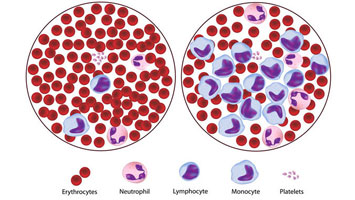
Leukaemia
Leukaemia is a type of cancer of the blood or bone marrow, where the body produces an excessive number of abnormal white blood cells. These abnormal cells crowd out healthy cells, weakening the immune system and impairing the body’s ability to fight infections, transport oxygen, and control bleeding.
There are several different types of leukaemia, classified based on the speed of progression (acute or chronic) and the type of blood cell affected (lymphocytic or myeloid).
Types of Leukaemia
1. Acute Lymphoblastic Leukaemia (ALL)
- Most common in children
- Rapid progression
- Affects lymphoid cells
2. Acute Myeloid Leukaemia (AML)
- Affects both children and adults
- Rapid progression
- Affects myeloid cells
3. Chronic Lymphocytic Leukaemia (CLL)
- Most common in adults over 55
- Slow progression
- Often symptomless in early stages
4. Chronic Myeloid Leukaemia (CML)
- Affects mainly adults
- Slow progression
- Associated with a specific genetic mutation (Philadelphia chromosome)
Causes and Risk Factors
While the exact cause of leukaemia is often unknown, several factors may increase the risk:
- Genetic predisposition
- Exposure to radiation or certain chemicals (e.g., benzene)
- Smoking
- Previous chemotherapy or radiation therapy
- Certain blood disorders
Symptoms of Leukaemia
Common symptoms include:
- Persistent fatigue and weakness
- Frequent or severe infections
- Unexplained weight loss
- Easy bruising or bleeding
- Fever or chills
- Bone pain or tenderness
- Swollen lymph nodes or enlarged spleen
If you or a loved one experiences any of these symptoms, it is important to seek medical advice promptly.
Diagnosis and Tests
Leukaemia is usually diagnosed through:
- Blood tests – to check for abnormal white blood cell counts
- Bone marrow biopsy – to confirm the presence of cancerous cells
- Imaging tests – to assess organ involvement
- Genetic testing – to identify specific mutations
Treatment Options
Treatment varies depending on the type and stage of leukaemia, as well as the patient’s age and overall health. Common treatments include:
- Chemotherapy
- Radiation therapy
- Targeted therapy
- Immunotherapy
- Stem cell (bone marrow) transplant
- Clinical trials – offering access to the latest treatments
Early diagnosis and advances in treatment have significantly improved survival rates, especially in children.
Living with Leukaemia
Living with leukaemia can be physically and emotionally challenging. Support is available through:
- Counselling and mental health support
- Nutrition and wellness programs
- Support groups for patients and families
- Financial and practical assistance
Get Involved
You can help in the fight against leukaemia by:
- Donating – to support research and patient care
- Volunteering – your time and skills
- Raising Awareness – in your community and on social media
- Becoming a stem cell or blood donor
Need Support?
- If you or someone you know is affected by leukaemia, we're here to help. Contact us at [85 85 85 88 28].
